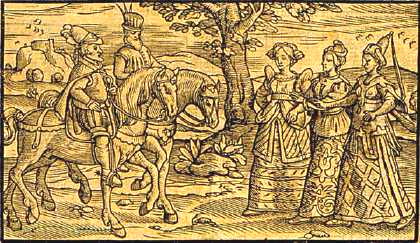Macbeth
According to Holinshed, Macbeth belonged to the powerful family of rulers of the northern province of Moray, and served under King Duncan I of Scotland.
Holinshed reports that Macbeth killed Duncan in battle, and that Macbeth laid claim to the throne by right of his wife Gruoch's royal descent*; thus the brutal--and almost bungled--murder of a guest is Shakespeare's invention. He also chooses not to mention Lady Macbeth's (possibly legitimate) claim to the throne. Macbeth ruled as King of Scotland from 1040 to 1057.
More on Macbeth and the witches.
The English connection
In due course Siward, earl of Northumbria, and Duncan's son, Malcolm, defeated and killed Macbeth at Lumphanan.
After the Norman Conquest (1066), Malcolm supported Edgar Aethling's claim to the English throne; but William I invaded Scotland in 1072, forcing Malcolm and Edgar to swear fealty. Malcolm's daughter, Matilda, married Henry I of England and was thus grandmother to Henry II--first of the Plantagenets and founder of the brief "Angevin Empire."
The later English connection is through James I, before whom the play was staged. James traced his ancestry back through a long line of Scottish kings (illustrated by mime in the scene where Macbeth consults the witches, 4.2.122-157) to Fleance, who escapes the Murderers, and thus to Banquo. Interestingly, although Malcolm does become king, like Macbeth his line is short-lived.
Footnotes
-
Gruoch's descent
She was a grand-daughter of Kenneth III, who was similarly overthrown by an ancestor of Duncan.
